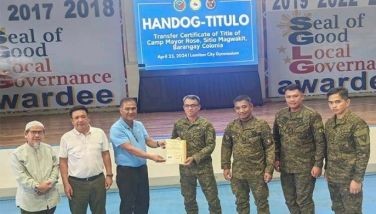Freed Australian hostage's family seeks justice
MANILA, Philippines (AP) — The family of a freed Australian hostage expressed hope Monday that his kidnappers, including al-Qaida-linked Abu Sayyaf militants who kept him in jungle captivity in the southern Philippines for 15 months, would be captured and punished so such ordeals would not be repeated.
Ex-Australian army soldier Warren Richard Rodwell was released early Saturday in Pagadian city in southern Zamboanga del Sur province, emaciated and barely able to walk from his long captivity in the hands of the Abu Sayyaf, a terrorist group dreaded for its signature act of beheading some of its hostages.
Australian and U.S. security officials brought Rodwell, 54, to a hospital in southern Zamboanga city to recover. He was on his way to the capital, Manila, later Monday.
Al Rasheed Sakalahul, vice governor of southern Basilan province who helped negotiate for Rodwell's freedom, said that Abu Sayyaf commander Puruji Indama agreed to release him after receiving 4 million pesos ($98,000) in ransom from the Australian's family last week.
Sakahalul, citing intelligence reports, said he suspected at least three armed groups, including the Abu Sayyaf, were involved in the kidnapping. Working together, two separate criminal groups appeared to have abducted Rodwell on the Zamboanga Peninsula and held him there or on nearby islands, while the Basilan-based Abu Sayyaf negotiated for money. Basilan, where the Abu Sayyaf was started in the 1990s, is a short boat ride from the Zamboanga Peninsula.
Rodwell is married to a Filipino woman whose cousin handed the ransom payment to Indama in Basilan's hinterland in Sakahalul's presence, the vice governor said.
Both the Australian and Philippine governments have strict policies of refusing to pay ransom. That left Rodwell's family to struggle to raise funds, including selling some of their properties, according to an official confidential report seen by The Associated Press.
"We don't encourage these ransom payments, but we can't stop the family from raising funds to save their loved one," Sakahalul said, expressing alarm at how different armed groups now appeared to be conspiring to carry out kidnappings.
After checking if the money was authentic, Indama counted the bundled bills and said he would order Rodwell freed. He even promised to return the money if the release was scuttled, Sakahalul said.
A Philippine military official who closely monitored the kidnapping said he suspected rogue members of the Moro Islamic Liberation Front, a former Muslim secessionist group that signed a preliminary peace accord with the government last year, the Abu Sayyaf and a kidnap gang called the Al Khobar group collaborated in kidnapping Rodwell.
Rodwell's sister Denise Cappello and brother Wayne Rodwell flew to Manila on Monday to meet him.
They read a family statement expressing hope that Philippine police could track down the gunmen.
"We hope they will be brought to justice so others don't have to experience what Warren has just been through," they told a news conference, declining to answer questions and appealing to journalists to give privacy to their exhausted brother.
They thanked Philippine and Australian officials who worked for Rodwell's release.
Over the last 15 months, Rodwell appeared in several proof-of-life videos posted by the militants. His jungle captivity appeared to have taken a toll on his health and he looked weaker in each video. Once, his desperate captors suggested they would behead him if they did not get a ransom payment.
When his captors let him go from a motor boat in Pagadian, the still-dazed Rodwell plodded through a muddy coast until he was found by a villager, who asked if he was a tourist. He replied that he had just been freed by kidnappers and asked for help.
The Abu Sayyaf, which is on a U.S. list of terrorist organizations, is believed to be still holding two Europeans, a Jordanian journalist, a Malaysian and a Japanese treasure hunter on southern Jolo Island.
U.S.-backed Philippine military operations have in recent years eased attacks and terrorist plots waged by the Abu Sayyaf, which is estimated to have 350 fighters who have split into several groups. But they remain a serious security threat in the impoverished region, where minority Muslims have been fighting for self-rule for decades.
- Latest
- Trending




























